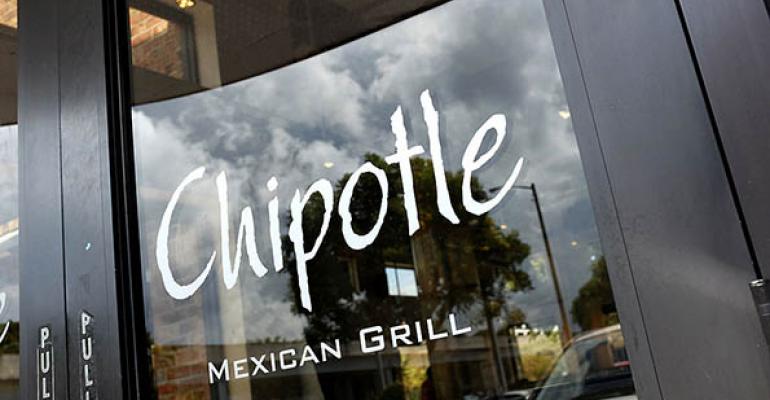Chipotle Mexican Grill Inc.’s 1,971 restaurants in the U.S. are scheduled to close for lunch on Monday for a companywide meeting that will be part update on new food-safety protocols and part rally to prepare for the return of customers.
Multiple foodborne illness outbreaks in the latter half of fiscal 2015 resulted in a dismal fourth quarter for the Denver-based chain, including a 30-percent decline in same-store sales during December, followed by an even worse 36-percent decline in January, the company said.
When restaurants across the country reopen at 3 p.m. local time on Monday, however, company officials hope a new era will begin for the fast-casual chain.
On deck is the largest marketing campaign in Chipotle’s history that will include significant use of freebies and discounts. Messaging will return to a focus on the taste of Chipotle’s food and use of quality ingredients.
“As we emerge from this difficult time, we can focus on what will be our primary objective for 2016: Making sure our food is as safe as possible and welcoming customers back to our restaurants as our teams deliver an extraordinary dining experience,” said Steve Ells, founder, chairman and co-CEO in a recent call with Wall Street analysts.
Monty Moran, Chipotle co-CEO, said the companywide meeting is “an opportunity for us to describe in detail to our whole team all of the steps that we have taken to make our food safer before it ever arrives at the restaurants, as well as to highlight and explain the reasons behind some of the new procedures that have already been implemented.”
The new food-safety protocols also include an aspect of accountability.
Field leaders now audit every restaurant on a weekly basis, Moran said. In addition, restaurants will be subject to quarterly audits by a third-party vendor, which the company did not identify.
This year, those third-party audit scores will account for half of manager bonuses, he said. The other half will be tied to customer service as the chain welcomes customers back.
“We believe this compensation realignment will further underscore for our managers and teams just how important it is to properly execute our food-safety procedures, and all of this will help us in establishing a heightened culture of food safety in all of our restaurants,” Moran said.
The foodborne illness crisis has not impacted turnover among the chain’s nearly 60,000 workers, he noted, adding that “we’re very, very proud of our restaurant teams.”
Moran said Chipotle’s employees are “super enthusiastic, very understanding of what we’re asking them to do and very, very competent in getting it done, even though we’ve made quite a few changes in a pretty short period of time.”
Some changes have riled customers, such as the removal of fresh lemons from drink stations. Now the chain offers lemons on request.
No more self-served lemons?? https://t.co/imMOZzQ9mz #Chipotle #ChipotleIsMyLife #ChipotleMinis
— Unlock the Minis (@ChipotleMinis) January 8, 2016
Such changes are also likely to be explained with the launch of a new website on Monday that will communicate Chipotle’s ongoing commitment to food safety, as it attempts to bring the risk of another foodborne illness outbreak to as near zero as possible.
In its annual report filed with the Securities and Exchange Commission on Friday, Chipotle warned of the challenges ahead, saying sales are expected to improve now that the Centers for Disease Control and Prevention declared the recent E. coli outbreaks over.
The brand, however, “will need to re-establish customer trust in light of the food safety incidents that negatively impacted us beginning in the fourth quarter of 2015, and doing so in the competitive environment in which we operate will be one of our key challenges in 2016 and beyond.”
The foodborne illness incidents resulted in $16 million in non-recurring expenses, including the cost of throwing out food, impairment charges for kitchen equipment that will no longer be used, insurance claim estimates, increased marketing expenses, lab analysis of food samples and swabs, and the hiring of food-safety advisors, the report said.
Chipotle’s average unit volume for 2015 declined to $2.42 million, compared with $2.47 million the prior year, though the outbreaks mostly impacted only the last two months of the year.
The 0.2-percent same-store sales increase for the year included a 3.5-percent increase attributed to menu price increases that was offset by lower transactions and group size, mostly in the fourth quarter.
In listing risk factors, which for any public company typically include worst-case scenarios, Chipotle warned that it may never recover sales to levels before the outbreaks hit the news.
The brand was particularly vulnerable, in part because customers had higher expectations as a result of its Food With Integrity promise, but also because social media likely raised awareness of the outbreak — and will exacerbate the impact of any potential outbreak in future.
Chipotle also cited among its risk factors the impact of numerous lawsuits filed by customers that were sickened in the outbreaks, as well as a class-action lawsuit filed by shareholders tied to the decline in stock price.
The company also cited the widened criminal investigation into its food-safety practices. Publicity of the legal proceedings could continue to hamper Chipotle’s ability to regain lost sales and attract new customers, the report said.
Expanding catering may also be a risk, given that food would be served in conditions the company cannot control.
“Even if foodborne illnesses arise from conditions outside our control, the negative impact from any such illnesses is likely to be significant,” Chipotle said.
Contact Lisa Jennings at [email protected].
Follow her on Twitter: @livetodineout





